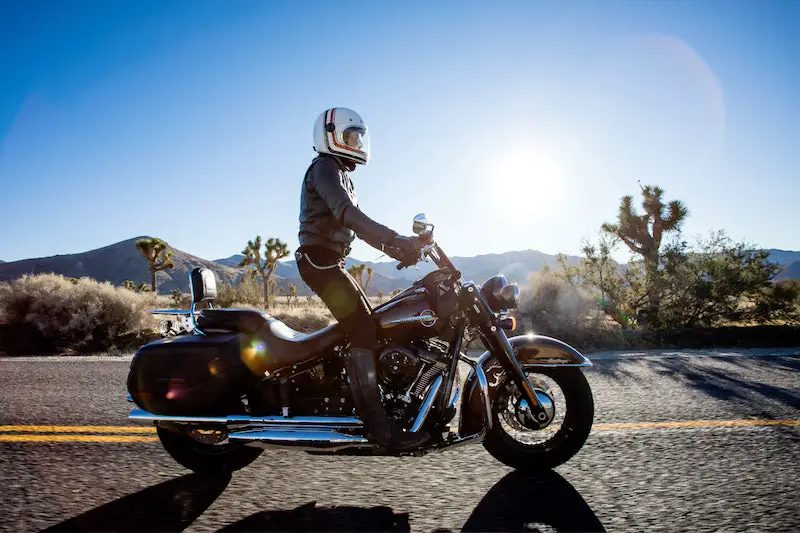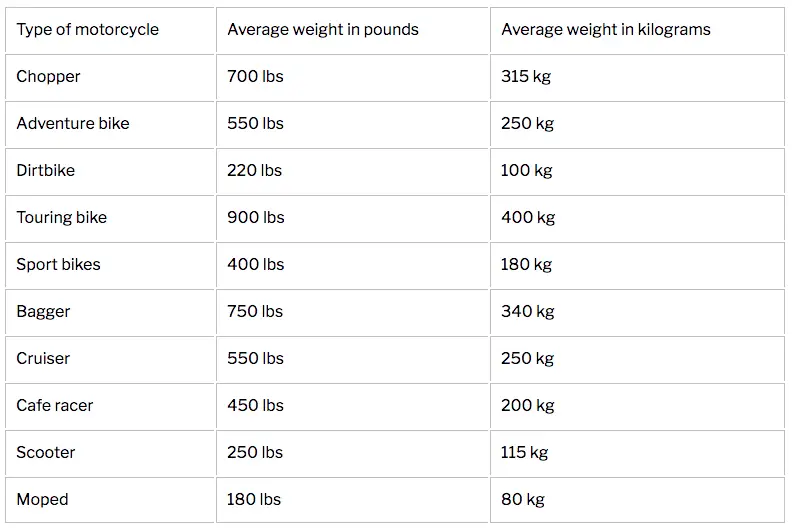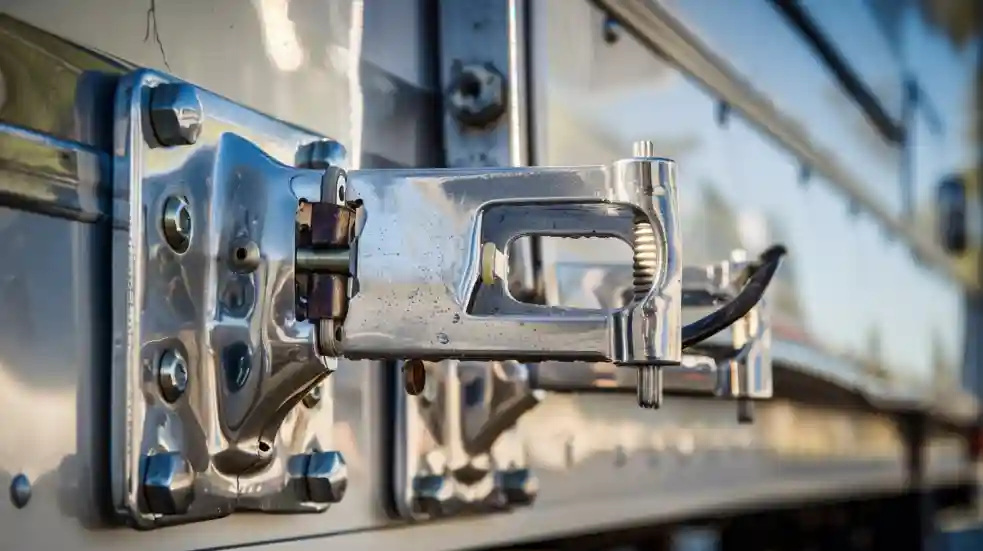
As a motorcycle enthusiast, you may have once found yourself wondering – how much does a motorcycle weigh? Obviously, most motorcycles have a different weight depending on their size, style, and whether the fuel tank is full or empty.
The weight of a motorcycle is important for a number of reasons. It’s a good idea to know how much a motorbike weighs if you’re planning on taking it off road or worried about dropping it.
There are also motorcycle trailer weight limits to consider, if you’re planning to tow a bike somewhere. Regardless, it doesn’t hurt to know average motorcycle weights for a variety of reasons.
In this post, let’s take a look at how much motorcycles weigh. This way you’ll be the most informed when it comes to the weight of different motorcycles.
Let’s jump right into it!
Jump Ahead To:
How Much Does a Motorcycle Weigh?
Overall, the average weight of a motorcycle is approximately 600 pounds (275 kilograms). This is going to be for a bigger bike, starting with a mid-size cruiser, maxi scooter, or 600cc+ sport bike.
The total weight depends on the size of the motorcycle, including its engine displacement, in the materials it’s made out of. Take a look at the table below for a better idea of average motorcycle weight based on the type of bike:

Looking at this table should give you a better idea of the weight of most different motorcycles and scooters. This can help you decide on a bike if you’re looking for something smaller and lightweight or if you’re okay with something heavier.
Why Does Motorcycle Weight Vary So Much?
There are a number of reasons why motorcycle weights vary so much between different bikes.
The biggest factor is the size of the engine, or engine displacement. Smaller bikes in the 50cc up to 300cc range used smaller engines and components. This means they’re going to weigh less and take up a smaller physical space as well.
Bigger bikes, specifically those 600cc and up, are where you start to get into heavier motorcycles. That’s because they have bigger engines, bigger components, and larger, heavier tires.
The type of bike also plays a role in how heavy it is. Dirt bikes, for example, need to be lightweight so they can be easily ridden across different terrains.
On the other hand, touring bikes are typically heavier as they come with loads of storage space, bigger wind screens, and other luxuries. All of this adds weight to the bike and makes it more bulky.
Components That Add Weight to a Motorcycle
Like we just mentioned, there are a number of different components that add weight to a motorcycle.
The Engine
It shouldn’t be surprising that the motorcycle engine is the heaviest part of the bike. That’s why bikes with smaller engines don’t weigh as much compared to those with larger engines.
There is a big difference in weight from a smaller, 125cc motorcycle and a large, 1800cc motorcycle. Heavier engines are typically found on adventure bikes (see our Honda CB500X review), cruisers, and sport bikes. Lighter engines are typically found on scooters, dirt bikes, and beginner motorcycles.
Larger engines weigh more because they are larger in size and use bigger, heavier components. They also require larger frames and other bike components to offer support.
Fairings
Apart from naked bikes, most motorcycles come with fairings. This is the hard plastic “shell” that defines the appearance of your bike.
Modern motorcycles typically come with hard plastic or carbon fibre fairings. Although these are lightweight materials, they can still add some significant weight to the bike.
Older bikes sometimes have aluminum or steel components. These are heavy materials and can really increase the overall weight of a motorcycle.
Naked motorcycles don’t come with any fairings and tend to be light then they’re fully-faired alternatives. Some of the lightest motorcycles are naked, smaller displacement bikes.
Luggage
Additional luggage, such as motorcycle saddlebags or motorcycle top boxes, can add some additional weight. Some people use this gear regularly and keep them installed on their motorcycle.
For motorcycle camping or touring, luggage needs to be added to carry additional gear. Not only is this going to add additional weight, it’s going to reduce the fuel efficiency of the motorcycle as well.
Obviously riding without any saddlebags or luggage is going to keep the weight of the bike at a lower level.
Build Materials
Finally, the materials used when building a motorcycle will have an impact on its overall weight. Older bikes used heavier materials, such as steel, and tend to be heavier overall.
Newer, motorbikes take advantage of better technology and use lighter materials. These include aluminum and hard plastic, which lowers the overall weight of the bike.
There are some great aftermarket upgrades, such as motorcycle exhausts, which can be used to replace older, heavier stock components.
Average Motorcycle Weights
How Much Does a Chopper Weigh? (~700 lbs)
- Kawasaki Vulcan 900 – 611 pounds
- Honda Fury – 663 pounds
- Suzuki Boulevard M109R – 764 pounds
The average weight of a chopper is 700 pounds. These happen to be one of the heavier motorcycles on the street.
This happens because older choppers are typically made using heavier materials. Newer choppers tend to be lighter, but they’re still heavier compared to most other types of motorcycles.
How Much Do Sport Bikes Weight? (~400 lbs)
- BMW S1000RR – 458 pounds
- Yamaha YZF 600 – 366 pounds
- Honda CBR600RR – 370 pounds
Despite their bigger engines, sport bikes typically aren’t as heavy as you would think. The average sportbike weighs around 400 pounds, or 180 kilograms.
This is because sportbikes are designed to offer a lot of power and speed. To get the most out of the engine, they need to be lightweight and nimble without any heavy components or accessories.
Most sport bikes will be lightweight and easy to manage on the street. Some of the higher-end models even come with carbon fibre fairings and other components, which helps to make them even lighter.
Dry vs Wet Weight
You may have seen motorcycle weights listed as the dry vs. wet weight. This has to do with the liquids on the bike.
A dry motorcycle weight is the weight of the bike without any fuel, oil, coolant, brake fluid, or any other fluids. The wet motorcycle weight is the weight of the bike with fuel, coolant, brake fluid, and other necessary fluids.
These fluids can add up to 45 pounds, or 20 kilograms, to the total weight of the motorcycle. There’s also the weight of the rider himself to consider.
If you’re wondering about the towing capabilities of your trailer for a motorcycle, look for the dry weight and add 45 pounds. This will give you the best idea of whether or not the trailer is capable for towing the bike you have in mind.



Leave a Reply